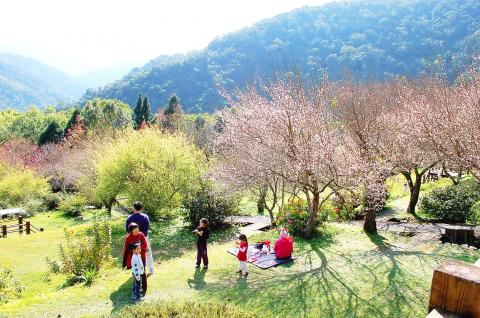Scientists and academics called for renewed efforts to protect the nation’s unique natural landscapes and distinct cultural traditions to set the foundation for the nation’s bid to have them included in the UN’s list of World Heritage sites.
Geography and natural resources professor Wang Hsin (王鑫) said Taiwan is blessed with a wide diversity of ecological environments and geological terrains, such as its coasts, lowland hills, high mountains, volcanoes, forests, wetlands and coral reefs.
“Many of these are unique in the world, and are found only in Taiwan,” he said.

Photo: Yang I-min, Taipei Times
However, because of “political interference from China at the United Nations level, these have yet to be listed among the World Heritage sites,” he said.
Wang, a member of the Council for Cultural Affairs’ World Heritage Promotion Committee, was speaking at a seminar on the “UN, Taiwan, and Natural World Heritage Sites” organized by the Taiwan New Century Foundation on Saturday in Taipei.
Since the committee — composed of scientists and other experts — was formed in 2009, it has chosen 17 natural landscapes and cultural sites around the nation as leading candidates for World Heritage site listing.
They include some of the best-known mountain regions: Yushan National Park, the Datun Volcano Group (大屯火山群), Taroko National Park and Cilan Mountain Cypress Forest Reserve (棲蘭山檜木林).
The candidates for cultural heritage sites are the Alishan Forest Railway, Tamsui’s Fort San Domingo, the Japanese-era Old Mountain Railway of Miaoli County, Kinmen Battlefield Culture and the Beinan Relic Site.
“Even though there are international political barriers, and it may be a long road, we must continue to engage in this work,” he said.
“I encourage more interested individuals and civic groups to participate in the various conferences held by UNESCO and the World Heritage Convention Committee, so they can get to know more about our world-class natural landscapes and cultural heritage sites. All of them are unique and cannot be found anywhere else,” he said.
Wang said Taiwanese can also set up their own recognition system and establish Taiwan’s own heritage sites.
“It is also important to show the world our success in natural resource conservation, with our national parks and forest conservation programs,” he said.
“The effort to join UNESCO’s listing is also a movement to promote local communities’ identity, and for individuals and civic groups to work together to protect and take pride in their natural environment and cultural traditions,” Wang said.

An essay competition jointly organized by a local writing society and a publisher affiliated with the Chinese Communist Party (CCP) might have contravened the Act Governing Relations Between the People of the Taiwan Area and the Mainland Area (臺灣地區與大陸地區人民關係條例), the Mainland Affairs Council (MAC) said on Thursday. “In this case, the partner organization is clearly an agency under the CCP’s Fujian Provincial Committee,” MAC Deputy Minister and spokesperson Liang Wen-chieh (梁文傑) said at a news briefing in Taipei. “It also involves bringing Taiwanese students to China with all-expenses-paid arrangements to attend award ceremonies and camps,” Liang said. Those two “characteristics” are typically sufficient

A magnitude 5.9 earthquake that struck about 33km off the coast of Hualien City was the "main shock" in a series of quakes in the area, with aftershocks expected over the next three days, the Central Weather Administration (CWA) said yesterday. Prior to the magnitude 5.9 quake shaking most of Taiwan at 6:53pm yesterday, six other earthquakes stronger than a magnitude of 4, starting with a magnitude 5.5 quake at 6:09pm, occurred in the area. CWA Seismological Center Director Wu Chien-fu (吳健富) confirmed that the quakes were all part of the same series and that the magnitude 5.5 temblor was

The brilliant blue waters, thick foliage and bucolic atmosphere on this seemingly idyllic archipelago deep in the Pacific Ocean belie the key role it now plays in a titanic geopolitical struggle. Palau is again on the front line as China, and the US and its allies prepare their forces in an intensifying contest for control over the Asia-Pacific region. The democratic nation of just 17,000 people hosts US-controlled airstrips and soon-to-be-completed radar installations that the US military describes as “critical” to monitoring vast swathes of water and airspace. It is also a key piece of the second island chain, a string of

The Central Weather Administration has issued a heat alert for southeastern Taiwan, warning of temperatures as high as 36°C today, while alerting some coastal areas of strong winds later in the day. Kaohsiung’s Neimen District (內門) and Pingtung County’s Neipu Township (內埔) are under an orange heat alert, which warns of temperatures as high as 36°C for three consecutive days, the CWA said, citing southwest winds. The heat would also extend to Tainan’s Nansi (楠西) and Yujing (玉井) districts, as well as Pingtung’s Gaoshu (高樹), Yanpu (鹽埔) and Majia (瑪家) townships, it said, forecasting highs of up to 36°C in those areas